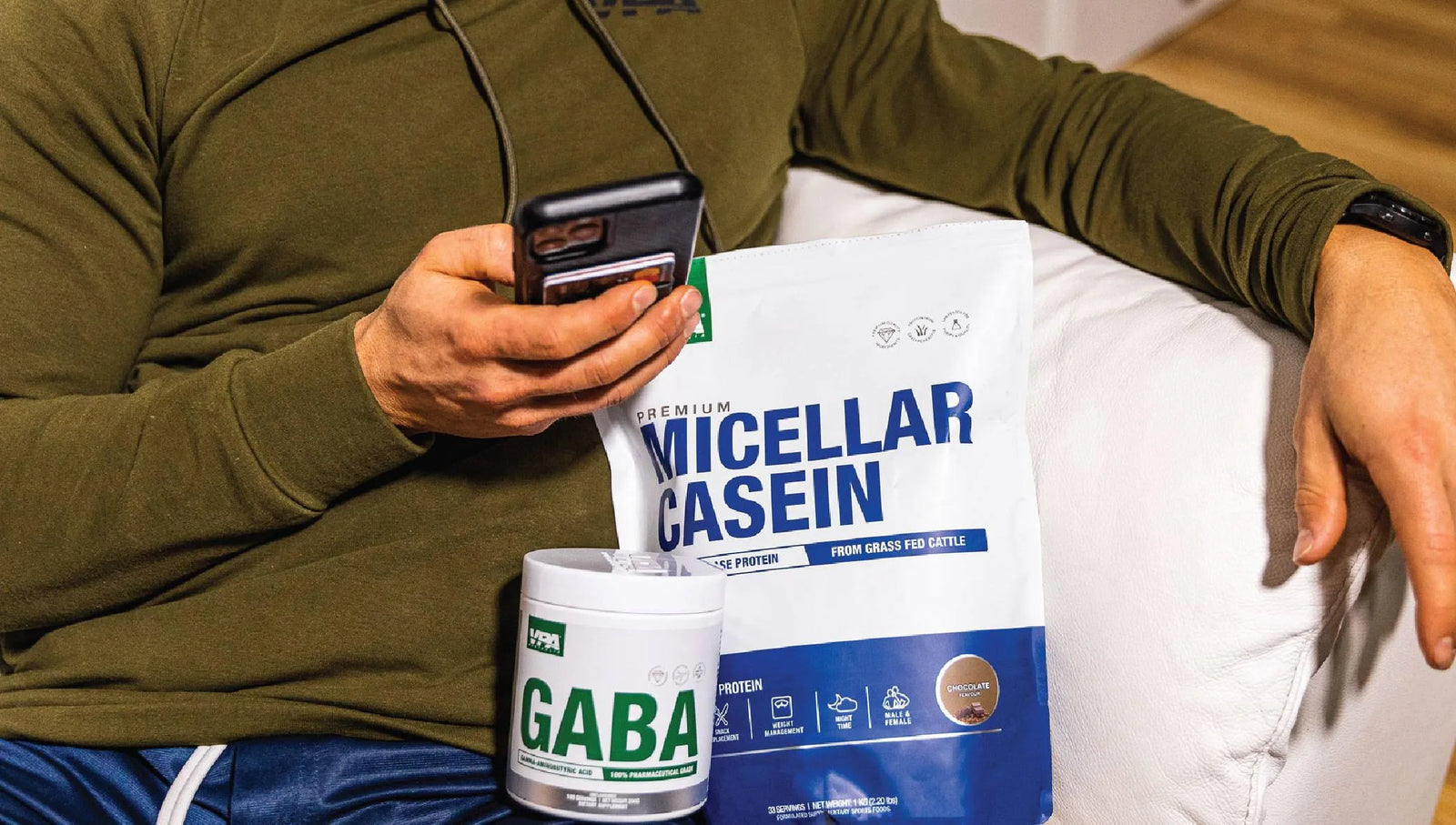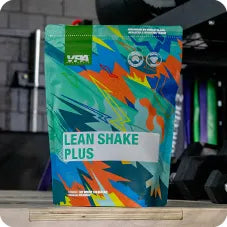Your Cart is Empty
Casein vs. Whey Protein: What’s the Difference?
March 20, 2021 9 min read

When it comes to protein supplements, casein and whey are probably the first ones that come to mind, and rightly so, these are two of the most popular choices of protein powders on the market.
But what sets these two proteins apart, and how do you decide which is right for you? In this blog, we’ll dive deeper into the difference between whey and casein, covering everything from nutritional content and benefits to uses and side effects.
What are Casein and Whey Proteins?
Cow milk contains two types of proteins — casein and whey– comprising 80% and 20% of its protein content, respectively. Both casein and whey are protein-rich, containing all essential amino acids, meaning they’re complete proteins. Although both are dairy-based byproducts of cheese production, they produce different results on a molecular level.
During the cheesemaking process, skim milk is treated with special enzymes or acids, causing the casein in the milk to coagulate. This coagulated part of the milk is casein and it can be used to make protein supplements as well as dairy products. The leftover liquid in this process is whey protein which is dried and powdered to create protein supplements.
Casein and Whey: Understanding Protein
Chemical and Physical Properties
One significant difference between whey and casein is the digestion and absorption rate. When casein comes in contact with the acids in the stomach, it forms a gel-like substance which is slower to digest and absorbed by the bloodstream. On the other hand, whey dissolves quickly and is rapidly absorbed, resulting in a quick spike in amino acids in your bloodstream. This means whey is better for workouts and intense activity when you need quick muscle repair and recovery.
Production Process
Both casein and whey are produced when heated milk is exposed to something acidic. In this sense, they’re both quite similar. Casein is the curdled part left in the process while whey is the liquid by product. Both undergo filtration and processing to convert into powder form which can be used to make protein supplements or dairy products.
Nutritional Content and Benefits
Nutritional Breakdown of Casein vs Whey
Here’s the nutritional breakdown of VPA Whey Protein Isolate and VPA Micellar Casein per standard scoop (30 grams):
| Nutritional Breakdown | VPA Whey Protein Isolate | VPA Micellar Casein |
| Calories | 114 | 113 |
| Fat | 0.3 grams | 1.5 grams |
| Carbohydrates | 1.4 grams | 0.9 grams |
| Protein | 24 grams | 23.6 grams |
Note: These values are based on VPA’s products and may vary. Always check product labels for specific information.
Essential Amino Acids Profile
Both casein and whey proteins provide all essential amino acids, but their profiles vary slightly in composition. Whey protein is particularly rich in branched-chain amino acids (BCAAs) – leucine, isoleucine, and valine – which are crucial for muscle recovery and growth. Leucine is known to initiate muscle protein synthesis, making it especially valuable for post-workout recovery. VPA Whey Protein Isolate, for example, delivers 5,766 mg of BCAAs per serving.
On the other hand, casein protein contains higher levels of amino acids like histidine, methionine, and phenylalanine. While it stimulates muscle growth as well, casein’s slower digestion rate means it provides a more sustained release of amino acids.
Casein vs Whey Digestion and Absorption Rates
Casein, when exposed to stomach acids, forms curds similar to those in cheesemaking. These curds slow down digestion, leading to a gradual release of amino acids that stay elevated in the blood for four to five hours after consumption. This slow, steady release makes casein an ideal choice before fasting periods, like sleep.
Whey protein, in contrast, is digested and absorbed quickly, with amino acid levels peaking in the bloodstream within 90 minutes of consumption. This rapid absorption is why whey is often recommended immediately before or after workouts, as it quickly supports muscle repair and growth.
Benefits and Uses
Benefits of Whey Protein
1. Higher Branched-Chain Amino Acid (BCAA) Content
When it comes tocasein vs whey for muscle building, whey protein is better due to its greater concentration of BCAAs, which play a critical role in muscle recovery and growth, particularly post-exercise.
2. Leucine Content for Muscle Growth
Whey protein provides a higher proportion of leucine, the amino acid responsible for initiating muscle protein synthesis. This makes whey a preferred choice for those aiming to maximise muscle growth.
3. Supports Metabolic Health
Whey protein may positively impact markers of metabolic health. Studies have found that it can improve fasting lipid levels, positively influence insulin, and potentially lower blood pressure, contributing to better overall metabolic health.
4. Easy to Mix and Better Taste
Whey is also relatively easy to dissolve and has a better texture and taste as compared to casein.
Benefits ofCasein Protein
1. Complete Protein with Essential Amino Acids
Casein protein is a complete protein, meaning it contains all nine essential amino acids that your body cannot produce on its own. Consuming casein ensures that you receive all the essential amino acids your body requires, supporting muscle maintenance, tissue repair, and overall health.
2. Supporting Muscle Preservation
Casein protein is a complete protein, meaning it contains all nine essential amino acids that your body cannot produce on its own. Consuming casein ensures that you receive all the essential amino acids your body requires, supporting muscle maintenance, tissue repair, and overall health.
3. Aids in Weight Management
When it comes to casein vs whey for weight loss,casein protein's slow digestion rate can promote satisfaction and help control hunger. Unlike fast-absorbing whey protein, which can make you feel full quickly, casein helps you feel fuller for a longer period.
4. Source of Calcium
Casein protein is a valuable source of calcium– an essential mineral for bone and dental health. Manycasein protein powders provide up to half of the recommended daily calcium intake, supporting strong bones.
Side Effects and Allergenic Potential
For most people, whey protein is safe and generally does not cause side effects if consumed within the recommended dosage. However, those who are sensitive to dairy may experience bloating, diarrhea, stomach pain, or nausea after consuming whey. This is where whey protein isolate, with its lower lactose content, can prove to be beneficial.
Similarly, casein protein does not have many side effects but may cause issues for those with lactose intolerance or a milk allergy. Some casein products also contain soy as an additive, which could be problematic for individuals with soy allergies. So it’s important to read labels properly.
Additionally, individuals with kidney disease or liver disorders may need to limit their protein intake. As protein is utilised by the body, it produces ammonia as a by-product, which can put pressure on the kidneys and liver. Therefore, it’s important to consult a healthcare professional before consuming protein supplements.
Lastly, excess protein supplements may cause dehydration. Therefore, it's important to stick to the recommended dosage and drink plenty of fluids.
Practical Applications of Casein vs Whey
When to Use Whey Protein
Because of its quick-digesting nature, whey protein is excellent when taken before, during, or after workouts as it fuels the muscles quickly. It’s perfect when taken in smoothies or protein shakes as it’s creamy and easy to mix with your usual smoothie ingredients. If you have difficulty digesting dairy proteins, check out our VPA®Premium Plant Protein as an alternative.When to UseCasein Protein
Casein is often referred to as the "bedtime protein" because it’s ideal for consumption before sleep or during extended fasting periods. Its slow release of amino acids helps keep you full longer, preventing hunger and muscle breakdown. Additionally, casein’s thick and creamy texture makes it easy to blend into smoothies, shakes, or even as a pudding
What to look for in Casein Protein Powder
Look forMicellar casein protein powderwhich is the purest and natural form of casein as opposed to hydrolysed casein which is more quickly absorbed as it has been processed.
VPA® Micellar Casein is the superior slow-digesting protein offering a slow drip feed supply of protein to your muscles over 8 hours.
Casein Vs Whey: Which is Best for You?
Let’s summarise the difference between whey and casein.
| Aspect | Casein Protein | Whey Protein |
| Source | Derived from the curdled portion of milk during cheesemaking. | Derived from the liquid portion of milk after casein has coagulated. |
| Digestion & Absorption Rate | Slow-digesting, releasing amino acids over 4-5 hours. | Fast-digesting, quickly absorbed into the bloodstream with peak levels within 90 minutes. |
| Optimal Timing | Best taken before fasting periods, such as bedtime. | Ideal for pre or post-workout to support rapid muscle recovery |
| Amino Acid Profile | Higher levels of histidine, methionine, and phenylalanine. | Rich in branched-chain amino acids (BCAAs), especially leucine, which stimulates muscle growth. |
| Practical Applications | Commonly used as a "bedtime protein" or in fasting periods for sustained amino acid release. | Commonly used before or after workouts for quick muscle recovery. |
The question now arises: What to select in the choice between Casein vs whey? Both casein and whey proteins are high-quality protein sources, and neither is inherently superior for health or fitness results. The choice between them largely depends on your personal health goals, lifestyle, and specific protein needs.
If your lifestyle involves daily strength training or high-intensity workouts, whey protein is probably the best option for you. If you’re trying to manage weight and tend to go longer between meals, casein might be a better choice for you.If you like to cook with protein powder, casein can be a better fit. Its thicker consistency works well in recipes like protein puddings, pancakes, and even ice cream, adding texture while keeping you full for longer.
There are other considerations to keep in mind:- Cost: Whey is typically more affordable per gram of protein.
- Texture and mixability: Whey generally mixes better, and has a creamy texture. Because casein naturally clumps together it feels thicker in the mouth, and it can sometimes feel a little lumpy.
- Casein vs whey taste: Whey tends to have a more appealing flavour and smoother texture than casein. However, VPA® Micellar Casein is available in amazing flavours like Chocolate, Iced Coffee, Banana, and Vanilla, so you can still enjoy a delicious protein boost with casein.
Combining Casein Protein and Whey Protein
Want the best of both worlds? Combining both proteins is the answer. Many people mix both to maximise muscle repair and growth by leveraging whey’s fast absorption with casein’s slow release. This combination can be especially useful for those with rigorous training schedules or those aiming to build muscle while maintaining muscle mass over time.
Conclusion
Both casein and whey protein are great choices for athletes, fitness enthusiasts, and gym goers. So select the one that you prefer based on your taste and budget or blend both for optimal results.
FAQs
1. Is it better to take whey or casein?
Neither whey nor casein is inherently better, as each protein has unique advantages depending on individual goals and timing. Whey protein is ideal for quick muscle recovery, making it suitable for pre or post-workout. Casein, with its slow-release properties, is often preferred for sustained muscle support, especially during fasting periods, like overnight. Many people combine both to maximise muscle repair and growth.
2. How do whey and casein proteins affect digestion?
Whey protein is quickly digested and absorbed, causing a rapid spike in amino acids, which makes it perfect for immediate muscle recovery. In contrast, casein forms a gel-like substance in the stomach, resulting in slower digestion and a gradual release of amino acids.
3. What are the potential drawbacks of casein protein?
Casein may not be suitable for individuals with lactose intolerance or milk allergies.
4.Is casein good for muscle growth?
Yes, casein supports muscle growth with its pure essential amino acid profile required for muscle repair and growth.
5.Are there any specific benefits of casein vs whey for weight loss?
Casein’s slow digestion rate can promote satiety, helping control hunger over longer periods, which can aid in weight management.
6.How should vegetarians or vegans approach whey and casein protein supplementation?
Since both whey and casein are dairy-based, they are not suitable for vegans. Vegetarians who consume dairy can consider these proteins. Vegans, however, might choose plant-based protein alternatives.
7.What should I look for when buying whey or casein protein supplements?
When selecting a protein supplement, look for high-quality sources.Micellar casein is the most natural and slow-digesting form, while whey protein isolate is a more refined form of whey with lower lactose.
References:
Van De Walle, G. (2023, July 3). What's the Difference Between Casein and Whey Protein?Healthline. Retrieved from https://www.healthline.com/nutrition/casein-vs-whey
Boirie, Y., Dangin, M., Gachon, P., Vasson, M. P., Maubois, J. L., & Beaufrère, B. (1997, December 23). Slow and fast dietary proteins differently modulate postprandial protein accretion.PubMed. Retrieved from https://pubmed.ncbi.nlm.nih.gov/9405716/
Pereira, P. C. (2014, June). Milk nutritional composition and its role in human health.PubMed. Retrieved from https://pubmed.ncbi.nlm.nih.gov/24800664/
WebMD Editorial Contributor. (2023, July 11). Workout Supplements: Whey vs. Casein Protein.WebMD. Medically reviewed by Mikstas, C., RD, LD. Retrieved from https://www.webmd.com/diet/whey-vs-casein-protein
Cleveland Clinic. (2023, July 13). 4 Benefits of Casein.Cleveland Clinic Health Essentials. Retrieved from https://health.clevelandclinic.org/casein
Also in Supplements

Fitness Goals for 2026 Made Simple: How to Set, Plan & Stick to Them
January 22, 2026 5 min read
Read More
The Ultimate 12-Week HYROX Training Plan (Beginner-Friendly + Expert-Approved)
December 04, 2025 7 min read
Read More Recent Articles
- 6 Best Pre-Workout Supplements in Australia (2026 Guide)
- Fitness Goals for 2026 Made Simple: How to Set, Plan & Stick to Them
- The Ultimate 12-Week HYROX Training Plan (Beginner-Friendly + Expert-Approved)
- What Is HYROX? The Complete Beginner’s Guide to the World’s Fastest-Growing Fitness Race
- The Ultimate HYROX Fuel Plan: When and How to Use Energy Gels for Maximum Output
- Collagen for Tendon Repair: Can Supplements Support Recovery?
- What Is Creatine Monohydrate? Benefits, Safety & How to Use It
- How Is Creatine Made? (Natural, Synthetic & Quality Standards Explained)
- What’s the Best Creatine in Australia? Here’s Why Monohydrate Still Reigns Supreme
- What Is Whey Protein? A Beginner’s Guide
${{amount}}














